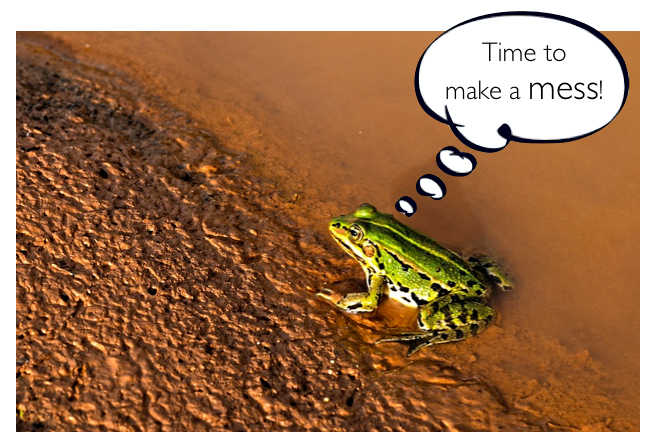
When you stop procrastinating you don’t just say goodbye to pulling all-nighters. You also say goodbye to a truckload of guilt, stress, and anxiety.
Below are 15 strategies you can use to help you stop procrastinating, decrease your stress levels, and get stuff done.
1. Start before you start
When you get home from school, set everything up so you’re ready to start your homework and assignments. Then go have a break to boost your energy levels. Your equipment acts as a visual reminder that you need to work and study. But not only that, there are less barriers to getting started. Everything is set up ready to go.
2. Set specific goals
The key to smashing out a good study/work session is to set a specific goal. Avoid setting vague goals such as, “I must study for health”. A better goal would be, “I will spend 10 minutes creating a mind map on the dangers of smoking”.
When you set vague goals, your brain says, “There’s no need to rush. You can do it tomorrow” But a specific goal sends your brain the message, “This is important. You need to get cracking!” Specific goals create a sense of urgency.
3. The ‘Do Something’ principle

Don’t know where to start? Feeling stuck? It doesn’t matter. You just need to do something. Anything.
In his brilliant book, Mark Manson talks about the ‘Do something principle’. He says:
“If you’re stuck on a problem, don’t sit there and think about it; just start working on it. Even if you don’t know what you’re doing, the simple act of working on it will eventually cause the right ideas to show up in your head”.
4. Work in 8 minute power boosts
Choose a task that you’ve been avoiding. Now set a timer for 8 minutes. Tell yourself, “I just need to work on this task for 8 minutes. That’s all I’ve got to do” But it’s 8 minutes of pure focus (e.g., no checking Instagram or Facebook).
When the timer goes off after 8 minutes, you can do one of two things:
1) On a roll? Keep going for another 8 minutes; or
2) Struggling? Stop and do something else.
5. The pomodoro technique

If 8 minutes doesn’t seem like long enough, then the Pomodoro technique is for you.
What’s a pomodoro? It’s the Italian word for tomato and it represents a tomato shaped kitchen timer.
One pomodoro is 25 minutes of focused work followed by a 5 minute break. After you’ve completed four pomodoros, you then get to take a longer 15-30 minute break.
Finished a pomodoro? Jot down an ‘X’ mark. Get distracted by a thought (e.g., “I want to check my email”)? Write it down quickly and get back to your work.
You don’t have to use a kitchen timer to time your pomodoros but it certainly helps. As Catherine Deveny says:
“There is something very liberating about outsourcing your start and finish time [to the timer]. You can’t just stop when you’ve had enough. You have to keep going until the bell goes off”.
6. The Snow White method
When Snow White came across the 7 dwarfs, the cottage was a total pigsty. The dwarfs were too overwhelmed and stressed out to clean up their mess. But Snow White did something very clever: she broke the space into seven small tasks and assigned each task to a dwarf. The place got cleaned up in no time.
You want to apply Snow White’s thinking to your assignments and schoolwork. It can be stressful thinking you have to write a 1,000 word essay. But if you break it down into writing 100 words at a time, it’s less scary for your brain.
7. The shower cap technique

This is a strategy comedian and author Catherine Deveny writes about in her brilliant book ‘Use your words’. She recommends you do the following:
“Buy yourself a shower cap. The ugliest one you can find. When it’s time to write, once you have set your time or word limit, put the shower cap on. Don’t take it off until you have met your goal”.
The psychology underpinning this technique is simple: having an ugly shower cap on your head is annoying and embarrassing. You’ll want to get it off as quickly as possible which means you’ll be less likely to procrastinate.
8. Manage those pesky, negative emotions
Don’t feel like doing your work? It doesn’t matter. Do it anyway. If you can manage your emotions then you have what it takes to manage your procrastination.
But in order to manage your emotions you need to get in touch with them. If you’ve been avoiding a task then there’s a good chance you’re feeling scared and/or overwhelmed. The simple act of acknowledging that you feel scared makes it less likely you’ll continue to procrastinate.
9. Grandma’s mashed potatoes method

Just like your grandma may have told you, “You don’t get to eat dessert until you eat all your mashed potato”, with this technique you don’t get to do something you really want to do until you’ve finished doing whatever it is you need to do.
Write a list of all the things you really want to do. Remember, you only get to do these things once you complete the task at hand.
10. Trick yourself into getting started
This is similar to the Snow White method but there is a subtle difference. Instead of working out all the steps involved in completing an assignment, just tell yourself to “Pick up a pen”, “Pick up a book”, or “Open the book to the relevant page”. These tasks aren’t overwhelming for your brain so you’re more likely to get started.
11. Commit your future self to a desired course of action
Some people pay personal trainers upfront to have 10 training sessions. After paying a lump sum in advance, it’s very hard to weasel out of your training sessions. In the same way, you can organise private study sessions with a tutor or a study group. This locks you into studying for a set period of time each week.
12. Start meditating

Find it challenging to stay focused? Get easily distracted? Then you probably procrastinate. But don’t despair! Studies have shown that practising meditation can help people to cultivate better attention.
Bottom line is: if you can pay better attention, you’ll be less likely to procrastinate.
So start meditating!
13. Set an implementation intention
Implementation intentions are basically goals that specify when, where and how the desired behaviour will be performed. They typically take a ‘If [X happens] then I will do…’ format. For instance, “If it is 5pm then I will take out my history flash cards and complete 10 minutes of revision”.
The act of deciding in advance what you will do at certain times and in certain contexts means you don’t need to think about the behaviour. You just do it. You can read more about implementation intentions here.
14. Give yourself permission to make a mess and stuff up

This strategy is perfect for perfectionists! Go make a mess. Write something really rubbish. Write something so bad that your teachers will be shocked and horrified (but don’t hand it in).
When you give yourself permission to make a mess and stuff up, you’re more likely to get started. Any result will be regarded as progress. The point is you’re making a start well before the due date (as opposed to the night before). This means you’ll have plenty of time to polish up your work later on.
15. Look out for procrastination warning signs
What do you typically tell yourself when you procrastinate? “I’ll start tomorrow”? “I’ll just go on YouTube for 5 minutes before I start this assignment”?
Pay attention to what you tell yourself just before you start to avoid doing your work. Think of these statements as warning signs, signals, or flags to look out for.
When you see a procrastination flag come up, stop yourself. Take a deep breath and say, “I’m about to start procrastinating. I must be feeling scared or overwhelmed” and then apply any of the strategies listed above.
To sum up
There you have it: 15 practical strategies that you can start using immediately to stop procrastinating.
At this point you run the risk of feeling overwhelmed by all of these strategies. So here’s what I recommend: choose one strategy. Doesn’t matter which strategy. Pick any of them and use it straight away. See if you can knock off a piece of work that’s been hanging around like a bad smell.
Before you get started, quickly leave a comment below about what strategy you’re going to test out and what piece of work you’ll be applying it to.

4 thoughts on “15 Strategies to Stop Procrastinating and Get Stuff Done”
Hey,
what would be an app i could download that would block my access to apps like facebook for certain amounts of time?
Hi Reluctant Fundamentalist 🙂
There are a few apps you can choose from.
For your laptop, check out:
Self control
Cold turkey
Anti-social
For your mobile phone, check out flipd (http://flipdapp.co/)
Once you download one of these apps, the key is to be disciplined and use the app!
The more you use it, the more likely it will be become a habitual part of your study routine.
All the best,
Jane
Hi Jane,
It’s ten days to my grade twelve final exams.
I wish I had seen your mind mapping strategies and other hacks waaaay earlier. But I am sure it’s going to come in handy…cause these aren’t the only exams I am going to write.
Thank you for them!
Great article and useful strategies!
Comments are closed.